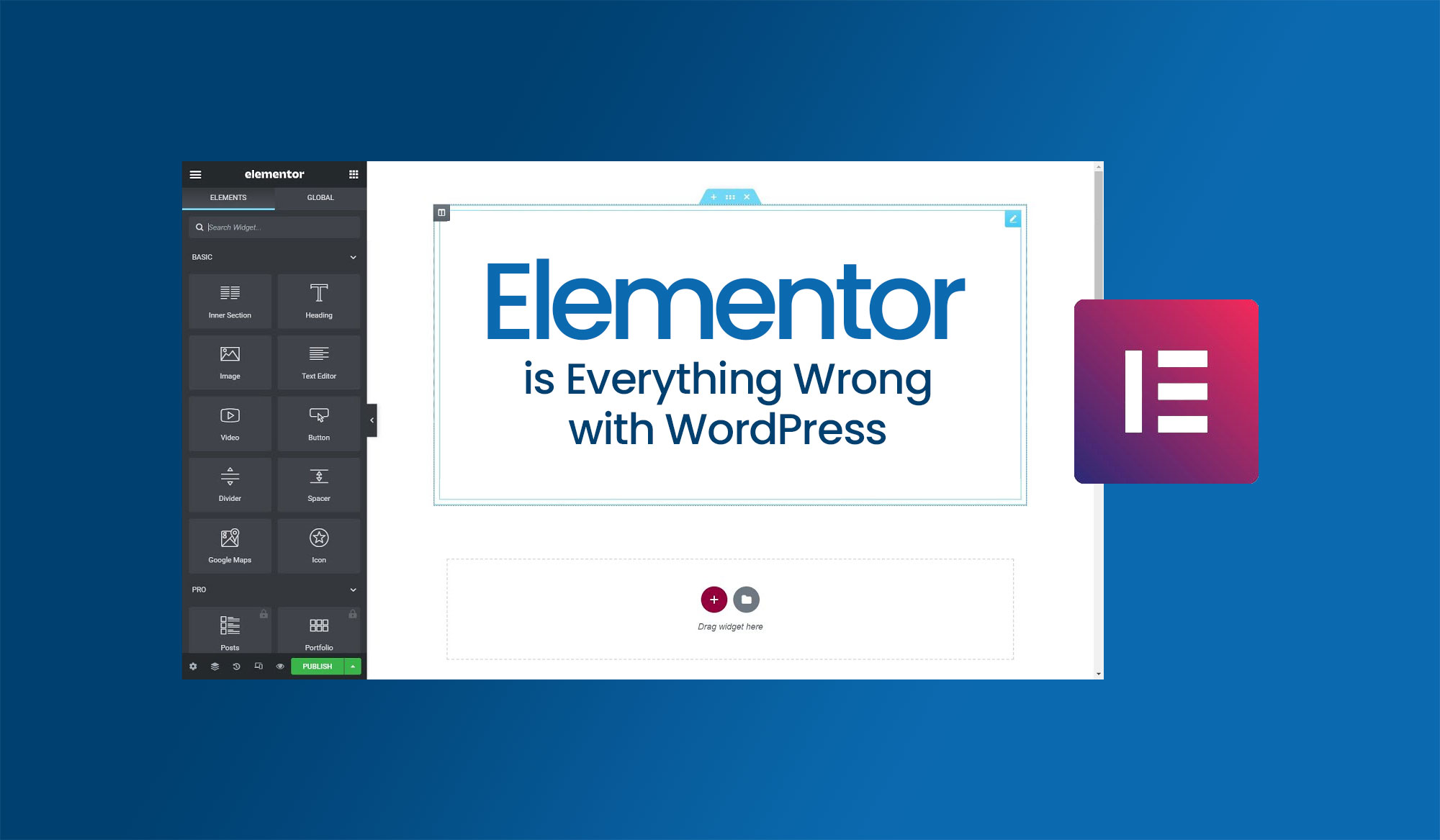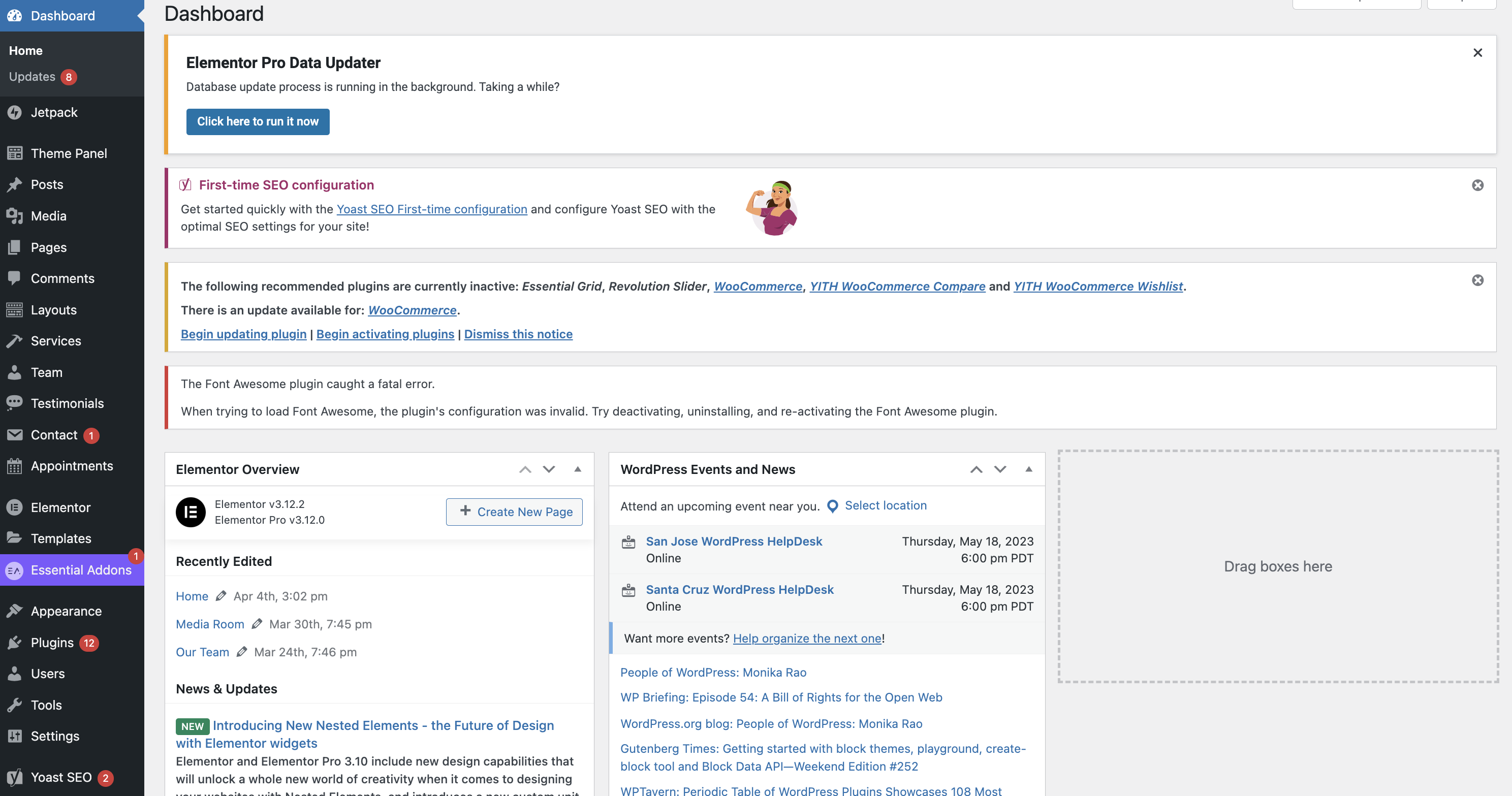In recent years, WordPress page builders like Divi and Elementor have seen a huge rise in popularity. However, it’s only after implementing these tools in their own websites that many business owners come to recognize their numerous drawbacks, often causing frustration and challenges. In this post, we’ll dive into why Elementor in particular represents everything wrong with WordPress and how returning to more optimized solutions like Gutenberg can elevate your website’s reliability, performance, security, and ease of management. Showcasing why the native WordPress builder is still the ideal way to build a website on WordPress, and why Elementor should be avoided at all cost.

Get expert help with your Elementor website from Hoot Host! Hoot Host specializes in managing Elementor websites. If necessary we will even migrate your business website off Elementor to a more streamlined version of WordPress completely for free. Fill out the form below to discuss your website with our support team.
The Misconception of Elementor’s Ease
Elementor has been marketed as an easy, drag-and-drop page builder, appealing to those without coding skills. However, this simplicity is a facade. Users often find Elementor to be disorganized, with a clunky interface that makes even basic updates time-consuming and complex. While their flashy marketing loves to showcase easy drag-and-drop functionality, many business owners find it is not nearly as easy in reality. Showcasing how the Elementor interface is a far cry from the promise of ease and efficiency.
Performance and Stability Issues
One of the core issues with Elementor is its impact on website performance. Websites built with Elementor often suffer from slow load times and poor performance scores, especially when evaluated against Google’s Core Web Vitals and Google Lighthouse standards. This is partly due to its heavy reliance on JavaScript and paid premium third-party add-ons.
Moreover, Elementor’s stability is questionable more and more every year. It’s increasingly known for breaking during WordPress core updates, causing significant downtime and headaches for website owners. This instability is a stark contrast to the reliability one expects from a professional WordPress site.

An example of a disorganized, bloated WordPress backend due to Elementor’s dependency on third party tools which cause performance issues, security vulnerabilities, and a complicated website management experience. The team at Hoot Host comes across nightmare Elementor websites like this constantly.
See HootPress to compare a lightweight, streamlined WordPress management experience.
The Plugin Predicament
Elementor’s dependency on numerous third-party plugins exacerbates its problems. Many Elementor sites are bogged down with an excessive number of plugins, leading to performance issues, security vulnerabilities, and code conflicts that cause fatal errors. This not only impacts the website’s functionality but also poses a significant security risk. Elementor based websites being hacked or suffering from malware injections has only increased in recent times. A quick Google will lead one to countless videos and articles discussing Elementor security issues, typically starting from excessive plugins and plugin vulnerabilities.
A Nightmare for Management
Despite its promises of ease and simplicity, Elementor turns website management into a complicated task. Business owners frequently complain about its difficulty, particularly when performing even basic updates. This complexity undermines one of WordPress’s fundamental philosophies: user-friendliness. Elementor is often reviewed as the least user-friendly page builder specifically for it’s disorganization and clunky interface.
WordPress was designed to be lightweight, highly optimized, and accessible. Elementor, however, leads to bloated, unstable, and difficult-to-manage websites. It represents a deviation from the streamlined, efficient experience that WordPress aims to provide.
The Case for Gutenberg and Optimized Builders
Shifting focus back to WordPress’s native Gutenberg builder or other lightweight alternatives is the key. These builders align with WordPress’s original vision, offering high performance, better SEO, and easier management without sacrificing design quality or user experience. They meet modern standards for high performance, accessibility, and SEO structure, all while being more stable and efficient with less third party dependencies or excessive plugins.
Say no to Elementor! Embrace the WordPress Ethos
Elementor’s popularity, despite its many flaws, highlights a critical misunderstanding of what makes WordPress great. It’s time to educate and encourage business owners to embrace builders that uphold WordPress’s ethos of efficiency, simplicity, and performance. Only then can we ensure that WordPress sites remain powerful, accessible, and easy to manage – just as they were intended to be.
“The joke I often make about Elementor is – You show me an Elementor website that has less than 10 plugins, no paid premium or third party dependencies, is easy for the business owner to manage themselves, and scores 90%+ on all 4 Google Lighthouse metrics mobile and desktop, and I’ll show you a unicorn! It does not exist.” – Christopher Carbaugh, Founder of Hoot Host
It’s time to return to the roots of WordPress, embracing solutions that embody its true spirit and capabilities. Elementor causes so many headaches for business owners using it, showcasing it clearly is everything WordPress was never meant to be.
This truth has led Hoot Host to implement a free solution to transition Elementor websites to more lightweight and streamlined versions of WordPress. This program has been an overwhelming success for dozens of business websites supported by Hoot Host.
Get expert help with your Elementor website from Hoot Host! Hoot Host specializes in managing Elementor websites. If necessary we will even migrate your business website off Elementor to a more streamlined version of WordPress completely for free. Fill out the form below to discuss your website with our support team.
